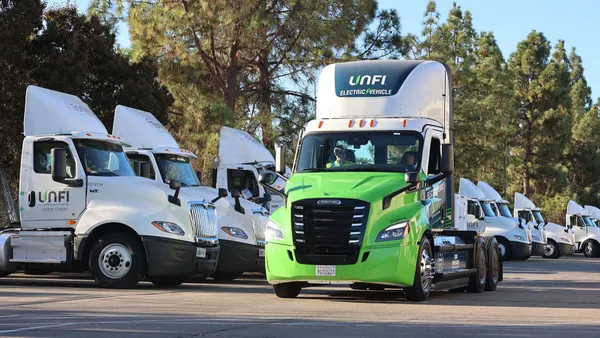Dive Brief:
- The Department of Homeland Security (DHS) will take "increased enforcement action" against — and is "actively investigating companies and corporate officials who knowingly benefit from" — forced labor and other ongoing human rights abuses concentrated in Xinjiang, China, according to a joint business advisory released Wednesday by Customs and Border Protection (CBP), DHS, the Department of Commerce and the State Department.
- The move comes after President Donald Trump signed the Uighur Human Rights Policy Act into law on June 17, which authorized sanctions against select Chinese officials for their role in interning members of the Uighur population, Muslims and other ethnic minority groups, in forced labor camps. The workers in the facilities produce components and finished goods for a number of global industries, from apparel to high-tech electronics.
- "CEOs should read this notice closely and be aware of the reputational, economic, and legal risks of supporting such assaults on human dignity," Secretary of State Mike Pompeo said during a press conference Wednesday. The advisory recommends firms practice due diligence in ensuring they do not provide goods to, and their lower supplier tiers do not source inputs from, Xinjiang's camps.
Dive Insight:
Human rights abuses carried out against more than 1.5 million Uighur and ethnic or religious minorities currently held in Xinjiang have been documented since 2016. While the Chinese government has publicly stated workers' presence in the facilities is voluntary, for educational purposes, or that the entities have been shut down altogether, evidence has repeatedly resurfaced demonstrating the rights violations continue.
According to the interagency advisory, these abuses "include mass arbitrary detentions, severe physical and psychological abuse, forced labor and other labor abuses, oppressive surveillance used arbitrarily or unlawfully, religious persecution, political indoctrination, forced sterilization, and other infringements of the rights of members of those groups."
The advisory recommends firms use the State Department's Responsible Sourcing tool and the Department of Labor's ComplyChain resource for help determining whether their supply chains are free of entities tied to Xinjiang's camps or other entities engaging in similar practices. These resources include country-specific data on labor trends, demographics and other factors that might contribute to suppliers relying on forced labor.
On Wednesday, the same day the advisory was issued, CBP seized a shipment of $800,000 worth of wigs and other human hair products, which the agency said it had reason to believe were produced using forced labor in the region.
"The production of these goods constitutes a very serious human rights violation, and the detention order is intended to send a clear and direct message to all entities seeking to do business with the United States that illicit and inhumane practices will not be tolerated in U.S. supply chains," Brenda Smith, executive assistant commissioner of the CBP Office of Trade, said in a statement.
Major brands, including Apple and Nike, have been found to be working with suppliers that source from facilities in Xinjiang.
In March, the National Retail Federation, Retail Industry Leaders Association, American Apparel & Footwear Association and the U.S. Fashion Industry Association released a joint statement saying, "The reported situation is of a scale, scope, and complexity that is unprecedented during the modern era of global supply chains," and announced the formation of a group to find and implement solutions.
However, in late 2019, a Verisk Maplecroft report found the volume of goods produced in these camps and entering U.S. supply chains has been increasing, despite growing awareness of the situation.
Because these facilities can be hidden in lower tiers of a complex global supply chain, the report cautioned that "standard due diligence practices are unlikely to be effective," and "if components ... are being made by detainees, the [Chinese] government will do its best to make them untraceable to other supply chains."
Despite the difficulty in ridding supply chains of these practices, particularly in lower tiers, the Department of Labor noted that, even if firms don't become the subject of legal action right away, reputational risks can be significantly damaging as well.
"A growing number of consumers are attuned to issues of labor abuse, particularly in industries such as apparel, footwear and electronics," according to its CompyChain website. "In addition, with the explosion of social media, exposés revealing child labor, forced labor or other degrading working conditions in a supply chain can more easily reach consumers and damage a brand’s reputation and adversely impact sales or stock prices."














